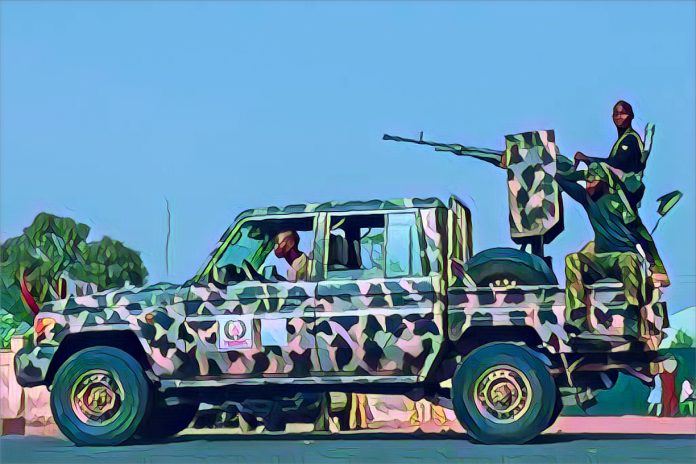The Nigerian army has announced that it has successfully cleared a hideout of the Indigenous People of Biafra (IPOB) and its armed wing, the Eastern Security Network (ESN), in the southeastern states of Imo and Abia.
The army said in a statement on Saturday that it had engaged the militants in a fierce firefight, resulting in the death of one ESN member and the recovery of several weapons and explosives.
The operation was part of the army’s efforts to restore peace and security in the region, which has witnessed a surge of violence and attacks on security forces and public infrastructure by the ESN.
The ESN is a paramilitary group formed by the IPOB, a secessionist movement that seeks to create an independent state of Biafra for the Igbo ethnic group. The IPOB and the ESN have been designated as terrorist organizations by the Nigerian government, which accuses them of fomenting unrest and destabilizing the country.
A History of Struggle
The IPOB and the ESN claim to be fighting for the rights and self-determination of the Igbo people, who have faced marginalization and oppression since Nigeria’s independence from Britain in 1960.
The Igbo, who are predominantly Christian, make up about 18% of Nigeria’s population of over 200 million people. They are mainly concentrated in the southeastern states of Abia, Anambra, Ebonyi, Enugu, and Imo.
The Igbo have a history of struggle for autonomy and secession from Nigeria. In 1967, following a series of massacres and pogroms against the Igbo in northern Nigeria, the then governor of the eastern region, Lt. Col. Chukwuemeka Odumegwu Ojukwu, declared the independence of the Republic of Biafra.
This sparked a brutal civil war that lasted for three years and claimed the lives of an estimated one to three million people, mostly from starvation and disease. The war ended in 1970 with the surrender of Biafra and the reintegration of the region into Nigeria.
However, the grievances and aspirations of the Igbo people have not been fully addressed by the successive governments in Nigeria, which have been accused of neglecting and underdeveloping the southeast.
The IPOB, led by itself-exclaimed leader Nnamdi Kanu, who is currently in exile in the United Kingdom, has revived the call for Biafra’s independence, using social media and radio broadcasts to mobilize its supporters.
The ESN, which was launched in December 2020, says it is a self-defense force that protects the Igbo people from attacks by Fulani herdsmen, bandits, and kidnappers. The group also opposes the presence of the Nigerian army and police in the southeast, accusing them of human rights violations and extrajudicial killings.
A Cycle of Violence
The Nigerian authorities have responded to the activities of the IPOB and the ESN with a heavy-handed crackdown, deploying troops and launching raids and arrests against the suspected members and sympathizers of the groups.
The tension and hostility between the security forces and the militants have escalated into a cycle of violence that has claimed dozens of lives and caused widespread fear and panic among the residents of the southeast.
In the past few months, the ESN has been blamed for a series of attacks on police stations, checkpoints, prisons, and electoral offices, as well as the assassination of prominent politicians and traditional rulers in the region.
The security forces have also been accused of carrying out indiscriminate raids, shootings, and arrests of civilians, especially young men, in the name of hunting down the ESN members.
The situation has worsened since the Nigerian government banned Twitter, a popular platform for the IPOB and the ESN to communicate and mobilize their followers. The government said the ban was necessary to prevent the spread of misinformation and incitement to violence, but critics say it is a violation of freedom of expression and an attempt to silence dissenting voices.
A Need for Dialogue
Many observers and stakeholders have called for dialogue and reconciliation as the only way to resolve the conflict and restore peace and stability in the southeast.
They have urged the Nigerian government to address the root causes of the agitation and grievances of the Igbo people, such as the lack of political representation, economic development, and social justice.
They have warned that the continuation of the violence and confrontation could lead to more bloodshed and suffering, and potentially trigger another civil war that could threaten the unity and integrity of Nigeria.
Source: Vanguard



